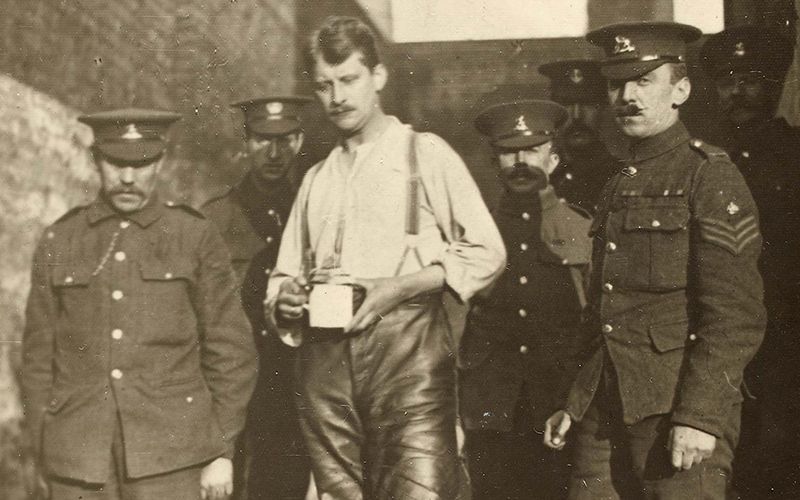| Eamon Morrissey. |
Maeve’s House
Written and performed by Eamon Morrissey
The Ireland that Irish writer Maeve Brennan left behind never really left her. No one knew this better than she did. In later years in New York she referred to herself as a “traveler in residence,” a nod to the fact that although she’d journeyed far from her first home in Ranelagh, South Dublin, it had already shaped her outlook and interior life.
In 1934 Brennan’s father was appointed the Republic of Ireland’s first minister to the United States, so her family had moved to Washington, D.C. and her new life as a reluctant American began. But it is interesting that in her art as well as her life, she never quite surrendered to her adoptive country, instead remaining at a critical tangent, as though she were afraid to lose something.
In Maeve’s House, the new show written and performed by noted actor and writer Eamon Morrissey and commissioned by Ireland’s Abbey Theatre, we are re-introduced to this flinty and fastidious short story writer through a series of impressionistic biographical tales and excerpts from her works.
In a detail that in part explains his lifelong fascination with her, Morrissey coincidentally grew up in the same Dublin house as Brennan many years later and was riveted to see it meticulously described in her work. That connection encouraged him to seek her out here in the 1960s when he was starring in Brian Friel’s Philadelphia Here I Come on Broadway.
But there’s much more to Morrissey’s fascination with Brennan than that. He’s an admirer of her career as a trailblazing Irish writer in the U.S., and his one-man show is part celebration and part rescue mission, to acknowledge her achievements and to salvage her luminous work from the obscurity that threatened to engulf them.
Maeve’s House certainly reminds us how well Brennan could write. Morrissey quotes liberally from her short stories and her celebrated New Yorker columns, and in the process this most exacting of writers reemerges in all her brittle glory.
The show reminds that Brennan’s characters are most often a luckless lot. Lives are lived in domestic drudgery, grudges are nursed for a lifetime, women and men find few points of contact but multiple points of conflict, and nothing is ever what it seems on the surface.
Through it all blazes her lighthouse intelligence, but her gloomy view of life and the restrictions it places on us often make for tragic reading.
Morrissey’s one-man show really unfolds like a private reminiscence more than a play. It’s quiet, intimate and reflective, which suits its subject’s prose style but perhaps not the theater.
Morrissey tells us he met Brennan in the Russian Tea Room in Manhattan in the 1960s, having been compelled to meet her after reading her writing about his childhood home. But he came away from their meeting slightly awed, the play tells us, uncertain of who she was as a person or in the precise nature of his interest in her.
A person as elusive and accomplished as Brennan makes for a fascinating subject, but in Morrissey’s script we only catch glimpses. It’s in Brennan’s own words that the play comes to life. Her scalding portraits of lives half lived have lost none of their potency, and Maeve’s House is most effective when the words are her own.
Director Gerard Stembridge does well to keep the pace with a script that relies solely on the word and not the image, but there’s no event here, there’s no sense of urgency, there’s certainly no theatre.
Brennan was brilliant and beautiful. She crafted a celebrated career in an age when Irish women of her era were seen as incubators for the state and not much else. She did mostly it on her own and she won serious admirers for her efforts.
Wasn’t that utterly remarkable? Could a drama not be crafted out of that?
What happened to Brennan – her mental deterioration, the lonely life she lived that went on and on – is certainly worth our investment, but Maeve’s House has little enough to say on the subjects.
Instead the play turns to her writing, which for its daring and insight, ranks among the most brilliant disavowals of the conservative Catholic Republic that the nation had become, and which Brennan monitored ceaselessly from overseas (where she certainly had a better vantage point).
Brennan was a tough and pitiless writer, compassionate and kind certainly but bracingly unsentimental. Her words burnish this meditative and slow moving play, and only when they arrive does it blaze to life.
Maeve’s House is playing at Irish Arts Center in New York until November 10. For tickets and showtimes visit www.irishartscenter.org.




Comments